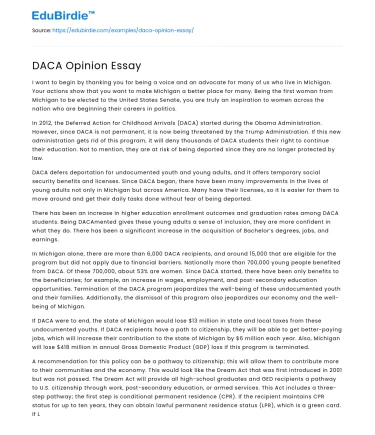I want to begin by thanking you for being a voice and an advocate for many of us who live in Michigan. Your actions show that you want to make Michigan a better place for many. Being the first woman from Michigan to be elected to the United States Senate, you are truly an inspiration to women across the nation who are beginning their careers in politics.
In 2012, the Deferred Action for Childhood Arrivals (DACA) started during the Obama Administration. However, since DACA is not permanent, it is now being threatened by the Trump Administration. If this new administration gets rid of this program, it will deny thousands of DACA students their right to continue their education. Not to mention, they are at risk of being deported since they are no longer protected by law.
Save your time!
We can take care of your essay
- Proper editing and formatting
- Free revision, title page, and bibliography
- Flexible prices and money-back guarantee
DACA defers deportation for undocumented youth and young adults, and it offers temporary social security benefits and licenses. Since DACA began, there have been many improvements in the lives of young adults not only in Michigan but across America. Many have their licenses, so it is easier for them to move around and get their daily tasks done without fear of being deported.
There has been an increase in higher education enrollment outcomes and graduation rates among DACA students. Being DACAmented gives these young adults a sense of inclusion, they are more confident in what they do. There has been a significant increase in the acquisition of Bachelor’s degrees, jobs, and earnings.
In Michigan alone, there are more than 6,000 DACA recipients, and around 15,000 that are eligible for the program but did not apply due to financial barriers. Nationally more than 700,000 young people benefited from DACA. Of these 700,000, about 53% are women. Since DACA started, there have been only benefits to the beneficiaries; for example, an increase in wages, employment, and post-secondary education opportunities. Termination of the DACA program jeopardizes the well-being of these undocumented youth and their families. Additionally, the dismissal of this program also jeopardizes our economy and the well-being of Michigan.
If DACA were to end, the state of Michigan would lose $13 million in state and local taxes from these undocumented youths. If DACA recipients have a path to citizenship, they will be able to get better-paying jobs, which will increase their contribution to the state of Michigan by $6 million each year. Also, Michigan will lose $418 million in annual Gross Domestic Product (GDP) loss if this program is terminated.
A recommendation for this policy can be a pathway to citizenship; this will allow them to contribute more to their communities and the economy. This would look like the Dream Act that was first introduced in 2001 but was not passed. The Dream Act will provide all high-school graduates and GED recipients a pathway to U.S. citizenship through work, post-secondary education, or armed services. This Act includes a three-step pathway; the first step is conditional permanent residence (CPR). If the recipient maintains CPR status for up to ten years, they can obtain lawful permanent residence status (LPR), which is a green card. If LPR is maintained for five years, the individual can apply for citizenship through naturalization.
Or we can start by changing the policies that allow tuition-equity at all Michigan Colleges and Universities. Unfortunately, in Michigan, undocumented student’s residency is not recognized, and they are forced to pay out-of-state tuition costs. Michigan needs to amend the state constitution to achieve a tuition-equity policy statewide.
Three stakeholders that benefit from DACA said that a pathway to citizenship would make all the difference in the world. Having citizenship means that they can receive financial aid to continue their education. One of the stakeholders also mentioned that “it will give me a chance to live a normal life; without fear of being sent to a country that I haven’t been to in 15 years.”
The U.S. Supreme Court will be reviewing the DACA program and will issue its decision in June 2020. In the meantime, as your constituent, I urge your support for the DACA program of 2012. As an immigrant’s daughter in this country, I understand the benefits of quality education, and I would like many of my peers to have the same opportunity. Thank you for your time and consideration of this matter.






 Stuck on your essay?
Stuck on your essay?

